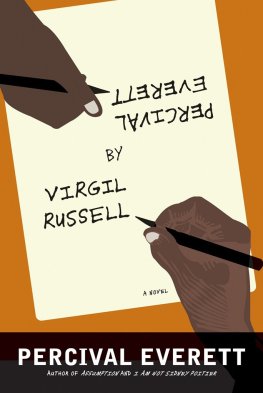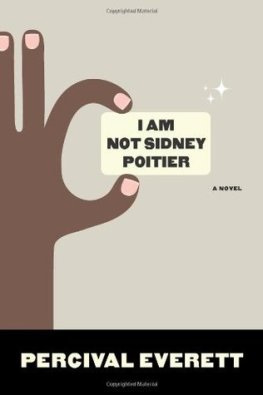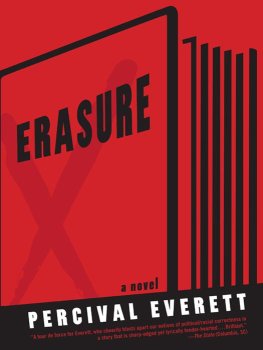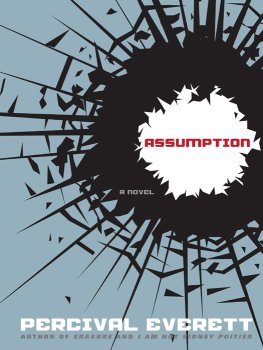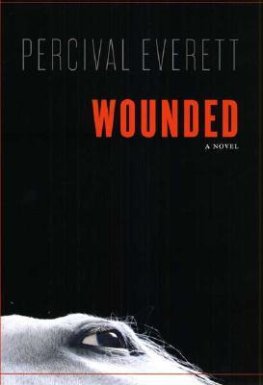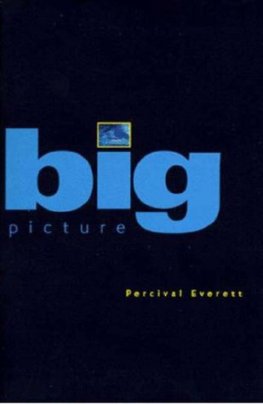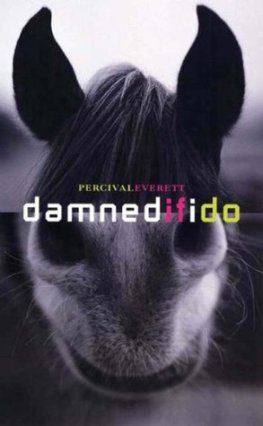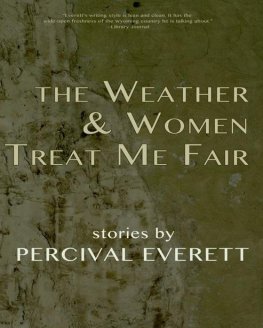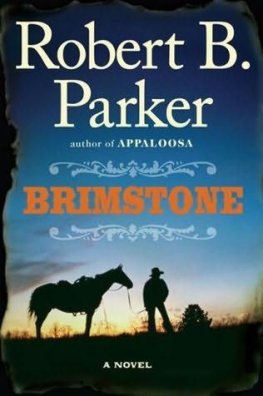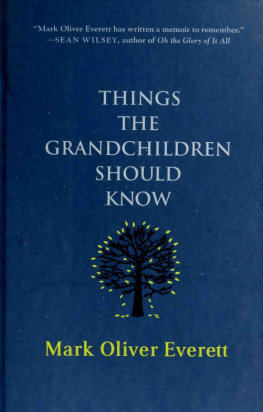Percival Everett
Percival Everett by Virgil Russell
For Percival Leonard Everett
1 August 1933 1 May 2010
PERCIVAL EVERETT BY VIRGIL RUSSELL
Let me tell you about my dream, my father said. Two black men walk into a bar and the rosy-faced white barkeep says we dont serve niggers in here and one of the men points to the other and says but hes the president and the barkeep says thats his problem. So the president walks over and gives the barkeep a box and says these are Chilmark chocolates and the barkeep says thank you and reaches over to shake the presidents hand. The president jumps back, says whats that? And the barkeep says its a hand buzzer, a gag, get used to it, asshole.
And that was your dream? I asked him.
As best I can remember. And Ive written something for you. He looked at my face. Not to you, but for you. Its sort of something you would write, if you wrote. Here it is:
And yet I continue to live. That was how my father put it, sitting in his wheelchair, the one he could not move around by himself, his right arm useless in his lap, his left nearly so, held up slightly just under his sternum, his new black Velcro-shut shoes uneven on the metal rests, this side of his face, the side near me, the left side, sagging visibly, his voice somewhere between his throat and the back of his tongue. And yet I continue to live. I had suggested that the 3 salt my mother was sprinkling liberally over his food might not be the best thing for his high blood pressure, even though at his age, in his condition, who could really deny the man the simple pleasure of too much salt, but my mother snapped at me, saying, Ive been taking care of him for a long time. My first thought was how true that was in so many good and bad ways. That was when my father spoke, making a joke and a comment and reminding me that in the vessel that looked something like him there was still the man I knew. And yet I continue to live, the right side of his mouth turning up in as much of a smile as his nerve-starved face would allow, and I laughed with him. My mother had not heard what he had said and even if she had, it would have been lost on her, but she reacted to our laughter, and that reaction was what it would have been if she had heard his comment and had understood, it would have made no difference, none at all, as she became angry, insecure, and jealous that we were sharing anything.
My father was depressed, it took no genius to see that, sitting there all day long in that room in what they call an assisted living facility, pressing his button and waiting for the orderly to come hook him up to a lift to take him to the toilet, pressing his button because the nurses were late getting him ready for bed and he was falling asleep in his chair, pressing his button because there was nothing else to do but press the damn button. I was depressed too, seeing him that way, then leaving to live my own life far away, knowing his condition, knowing his sadness, knowing his boredom, and depressed because I could for days on end live my life without feeling the horror of his daily existence. What I didnt know was how he could continue to live, sitting there day after day, seeming so weak, feeling so little through his body and feeling so much through his mind, his hand shaking, a crooked finger in the air when he was trying to tell me something, I could even see it when we were on the phone. How, like this, at seventy-nine could he still be alive? Then during one of my useless visits, visits that I made because I felt I ought to, visits I made because I loved him, though I always seemed to make him sadder, he said, his crooked finger resting peacefully on the back of his right hand, What do you think of this? His voice was clearer that it had been in years, the words finding the full theater of his mouth, his eyes sharp on me. I think its awful, I told him, because he asked for very little and deserved the truth. You should love your father more, I think he said, the voice again retreating. I asked if he thought I didnt visit enough and he shook his head, a gesture I didnt know how to read and left me wondering if he meant that I did not visit enough or that I did. Do you want me to visit more? I asked and he looked at me with the eyes I had always known and even though now they were milky and red and weak, they became his again and he said, Just one more time.
I flew away from Philadelphia feeling that I understood all too well and tried not to understand anything, tried not see anything. There was an animated in-flight movie that I watched without sound and I was struck by just how realistic the whole thing was, the talking animals and stretched faces seeming to make perfect sense. I missed my daughter and was glad to be flying home, found some light in the thought that she would be peacefully sleeping when I walked into the house and that I would peek into her room and see her face in the glow of her night-light. And I resolved that I would never put her in the position that I was now in, that I would not let my body fail me to the point that I could not control my own time and space and direction. It had all sneaked up on my father and on me as well, thinking, he and my brother and I, that he would turn a corner and be new in some way, but that corner turned out to be a steep hill and gravity turned out to be as inevitable as we all know it is. And as quickly as the thought of my daughter had brought me back to some happiness, my love for her returned me to a rather selfish consideration of my own future, however cloaked in that fake veil of concern for what she would face, and finally back to the matter at hand, the question put to me, the request made by my father. But how?
You dont live in Philadelphia, I told him. Dad, were both here in California.
Its called fiction, son. This is the story you would be writing if you were a fiction writer.
Its depressing.
Youre damn right its depressing. Youre not very bright, are you?
What am I supposed to do with this?
Finish it.
If you kill me, he said, if you kill me, then I will be sad, yes, confused, no doubt, maybe even angry, if you kill me, and if you dont, if you dont kill me, then I will feel nothing, feel nothing forever, he said to me, and that is a long time. This while he held his book that his failed vision would not allow him to read, not the Bible or any bible, as he would never, in the light or in the dark, actually or pretend to read the Bible or any bible, but he held in his lap, useless in his lap, his soiled Principia Mathematica and he spoke of Russell glowingly and admitted he knew little about Whitehead except that his name was unfortunate. I cant read this anymore, he said, this book, because my eyes are useless. I hate similes, my father said, have always hated them, even the good ones and there are no good ones, except maybe this one. His useless eyes narrowed and he said, I sit here, useless, like a bad simile, then he said, perhaps I should say any simile, given what I just said, the adjective bad being superfluous. If you kill me, if you do, he said, then I wont tell, if you dont tell me that I am telling my story, is what he said. I wont tell the world that I have no son if you make it so that you have no father, because I cannot walk or even tremble, he said, Russell was a good man, was good to Wittgenstein even though Wittgenstein was a pompous asshole. Well, heres a game for Ludwig, Pin the Tail on the Narrator, and he began with no pause except for that silence that must exist before one begins, and he said to do away with he said and began with I was born when I was twenty-three or maybe he was born when he was twenty-three, a year much better than the twenty-second, during which he tried to kill himself with paracetamol, his liver would never recover completely, his father and he unable to agree, to come together, harmonize, or square, his father, doctor father, Doctor Father, unable to fathom why in 1960 his son would rather fill his head with logic than go to medical school because how would he support himself and a family and then at twenty-three and in medical school he was happy, and no one understood why, even if he had told them they would not have understood, happy because he finally understood that the Ontological Argument was sound and yet he knew with all certainty, beyond all doubt, that there was not and had never been any god. If there was no god and the argument for his existence was sound, then language was a great failure or deceiver or bad toy or good toy, that it could be wound up or twisted and if he knew that, that it could not be trusted, then he knew where to put it, how to view it, that it was there for his pleasure, that it was not pernicious, for how could a thing so twisted finally mean anything. Therefore, the lovely therefore, as the argument carried, not a good argument like the Ontological Argument, perhaps not even sound or valid, that he could become a doctor, be a husband, be a father, and rest, if not easy, but rest knowing that it was all a game, not some silly language game, but a walking, running, tackling, blocking, dodging, hitting, hiding, sliding, diving game where everybody dies before they find out its just a game. But he was twenty-three when he understood what he would for the rest of his life refer to as

